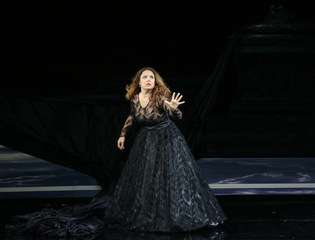|
Back
A Pirate in the Urals Milano
Teatro alla Scala
06/29/2018 - & July 3, 6*, 9, 12, 14, 17, 19, 2018
Vincenzo Bellini : Il pirata
Nicola Alaimo (Ernesto), Sonya Yoncheva*/Roberta Mantegna (Imogene), Piero Pretti (Gualtiero), Francesco Pittari (Itulbo), Riccardo Fassi (Goffredo), Marina de Liso (Adele)
Coro del Teatro alla Scala, Bruno Casoni (chorus master), Orchestra del Teatro alla Scala, Riccardo Frizza (conductor)
Emilio Sagi (stage director), Daniel Bianco (sets), Pepa Ojanguren (costumes), Albert Faura (lights)

S. Yoncheva (© Brescia-Amisano/Teatro alla Scala)
This was a long-awaited event: the return of Il pirata to Teatro alla Scala, where Bellini’s third opera (and first resounding success) had first premiered in 1827. For all intents and purposes absent from the repertoire for many decades, it was resuscitated in 1958 by none other than Maria Callas, who helped make the work somewhat relevant for modern audiences. With such history also comes great expectation; sadly, it was not met. The work itself is an early composition by a then 26 years old Bellini and as an artistic success, it is far in stature from his best-known masterworks, La sonnambula, Norma and I puritani. Though Il pirata contains some beautiful melodies and lyrical passages, it is less powerful than the composer’s other less famous, more mature works I Capuleti e i Montecchi and especially his infrequently performed masterpiece Beatrice di Tenda. For this reason, a revival of the Il pirata is pertinent, only if it assembles the necessary elements for success. Alas, this was a missed opportunity for the prestigious institution that is La Scala, whose resources should easily have afforded to assemble the perfect singers, conductor and stage director for the occasion.
At its premiere in 1827, Il pirata had a dream cast that featured tenor Giovanni Rubini, soprano Henriette Méric-Lalande and bass-baritone Antonio Tamburini in the roles of the pirate Gualtiero, his beloved Imogene and her cruel husband Ernesto. After Callas’ 1958 performances of this hitherto neglected opera at La Scala and Carnegie Hall, Il pirata was occasionally produced on various stages, interpreted by such artists as Montserrat Caballé, Mara Zampieri, Lucia Aliberti, Renée Fleming, Nelly Miricioiu and Mariella Devia, all sopranos famous for their vocal technique. Although Sonya Yoncheva is an accomplished singer that I have previously admired as Gilda, she was not ideally cast as Imogene. Though she has a solid technique, Yoncheva’s voice is not warm and is unable to do justice to Bellini’s elegiac music. Bel canto is not just high notes and embellishments; it is the merging of words with music to become an inseparable entity. Despite generally good diction in Italian, the versatile Bulgarian soprano communicated little of the heroine’s pathos. In the famous first act aria “Lo sognai ferito, esangue,” the words were not always intelligible – a must in Bellini’s music! The final scene, and the highlight of the opera, “Col sorriso d’innocenza,” was vocally accomplished, but emotionally weak. Imogene’s torment was not felt in Yoncheva’s voice, but the stage director compensated by having the soprano entangled in long curtains suspended from the ceiling. Visually effective, this trick did not compensate sufficiently for the rather vapid interpretation. Astonishingly, she was enthusiastically acclaimed by the Milanese public. Tenor Piero Pretti was a revelation in the heroic role of Gualtiero. He had no difficulty with high notes and definitely exuded the pirate’s virility and passion. His second act aria, “Tu vedrai la sventurata” was especially moving. Sadly baritone Nicola Alaimo was not in fine form. His voice was tired and, at times, ugly. However, the production’s supporting roles were expertly cast. Marina de Liso was a luxury in the small role of Imogene’s confidante Adele. Her rich mezzo contrasted well with Yoncheva’s soprano. Her moving portrayal of a compassionate companion, frustrated by her inability to help her mistress, was convincing. Bass Riccardo Fassi was in excellent voice and had strong stage presence as Gualtiero’s companion, Goffredo. The chorus, which is crucial in Bellini’s works, was well-rehearsed. Riccardo Frizza led the orchestra with brio, but with inadequate feel for Bellini’s music.
The biggest disappointment with this production was in its staging. The opera, based on a Gothic play, Beltram, is about a pirate, i.e. a sea-faring bandit, and takes place on the sunny island of Sicily. Director Emilio Sagi instead chose an austere, cold setting that would be appropriate, though still unappealing, for Tchaikovsky’s Eugene Onegin or Rimsky-Korsakov’s The Snow Maiden. Most likely, the snow-covered, austere landscape was meant to indicate Imogene’s loveless marriage to Ernesto. But even so, the absence of the sea from Sagi’s sets remained a mystery. The storm scene, given the land-locked setting, was dismally evoked by strobe lights. Pepa Ojanguren’s costumes were appealing, though again inappropriate. Rather, they reflected a stark setting, far from the intended Mediterranean setting. If insightful, liberties taken the epoch and the setting of a work are always welcome. Sadly, Emilio Sagi’s changes seemed gratuitous, evoked little emotion, but plenty of unwelcome distraction.
Ossama el Naggar
|